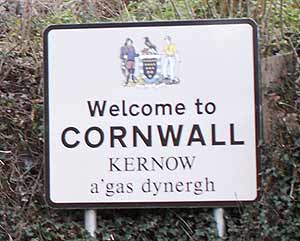1. Welsh has no vowels
I was once offered a Polish keyboard – after all with all those consonants in my name I could only be Polish, right? The truth is that Welsh has two more vowels than English – ‘y’ and ‘w’ and, of course, the double-letter digraphs count as one because they make one sound – ‘ch’, ‘dd’, ‘ll’, ‘th’, ‘ff’ and ‘rh’. English speakers’ difficulties with these ‘challenging’ letters were the prompt for the creation of the longest place name, Internet domain and train station name in Europe: Llanfairpwllgwyngyllgogerychwyrndrobwllllantysiliogogogoch (or Llanfair PG as it’s known to the locals).
2. Welsh is difficult to spell
As we’ve seen above, certain Welsh sounds may be difficult to pronounce for the uninitiated, but it’s a myth that Welsh is difficult to spell. Welsh is phonetic so what you see is what you say. Welsh children are saved the struggle with the ‘cough/though/hiccough’ type of problem when first learning to read. Of course, they have to master mutations, but that’s a different matter…
3. Regional dialects are so different that North and South Walians can’t understand each other
Like most languages, Welsh has regional variations. Just like a Geordie’s speech differs from a Somerset farmer’s and vice versa, North and South Walians have their own variants of Welsh – indeed dialect words can vary even from town to town. While British English gives higher status to Received Pronunciation than to any of its other accents, there is more appreciation in Welsh for dialects from different areas and accents are more likely to be indicative of geography than of social class. However, most of the differences are superficial affecting some commonly-used words and with increasing use of standard Welsh on signs, television and radio, speakers can converse with their counterparts in different areas without any difficulty.
4. Welsh is only used for secrets
This myth goes hand-in-hand with the anecdote of an Englishman walking into a pub (note that it’s always an English man, never a woman) only to find the locals switching to Welsh as he makes his way to the bar. The story claims that Welsh speakers in majority Welsh-speaking areas spend almost all their time speaking English and only ever change to Welsh when they spot an approaching Englishman. While this story does not stand up to any scrutiny, it is true that Welsh, like Navaho, was used as a code language during World War II and the Balkan War.
5. Nobody watches S4C – the Welsh-medium television channel
The Welsh language channel S4C was launched in 1982, the result of a bitter struggle by Welsh speakers including refusal to pay for television licences, scaling television masts and even a hunger strike. With more competition than ever, both from digital channels and from the Internet, S4C has received bad press recently with very low viewing figures for some its programmes. However, Pobol y Cwm, the BBC’s longest-running soap, continues to be popular with some episodes attracting 100,000 viewers or about 1 in 6 of the potential audience, while an EastEnders episode in the same week may reach 9.6 million viewers, also around 1 in 6 of its potential audience.
6. There is no Welsh word for….
“There is no Welsh word for taxi, snooker, Internet…” is a common refrain from detractors of the language. The Welsh language adopted the Greek word ‘tacsi’ the English word ‘snwcer’ and Internet is translated as rhyngwe. Foreign borrowings are part of the normal development of any language that must adapt if it is to survive. Welsh does indeed include many words adopted from English and, of course, English itself has more foreign borrowings than most other languages. Furthermore, new words are coined every day to deal with modern inventions and while some do not catch on (exhaust pipe is more often called egsôst than pibell wagio), most others do, just like in any other language.
7. Religious hymns are the only Welsh music
Any television programme about Wales is likely to feature the obligatory hymn sung by a male voice choir, in the same way that Ireland would be represented by a jaunty jig and Spain by Flamenco. While it’s true that hymns are still popular in Wales, in rugby stadiums and pubs as much as in chapels and churches, that is not the only type of Welsh music. There is a lively popular music scene, including some acts who gained prominence in the rest of the UK such as Supper Furry Animals and Gorky’s Zygotic Mynci. Folk dancing and singing remain popular, if a little sidelined. While the non-conformists attempted to stamp out folk music and dancing in the 19th Century, the Welsh Romany contributed to keeping these alive and made an important contribution to the harp tradition in particular. In fact, clog dancing is now so popular that a clog amnesty has been declared to deal with the shortage of clogs.
8. The Welsh language is dying
Although the 2011 Census showed a decline in the number of speakers the Welsh language is not considered endangered. Leading linguist David Crystal stated that it is safe and, with half a million speakers, is in the top 7% in the world. Census figures also show that many speakers are young and interest in Welsh-medium education remains steady. Welsh has a presence in new technologies with Welsh Wikipedia growing every day and the language comes third in the ranking of minority languages most used on Twitter. In 1961 Saunders Lewis had predicted that Welsh would “end as a living language, should the present trend continue, about the beginning of the twenty-first century.” Fortunately, he has so far been proved wrong.


